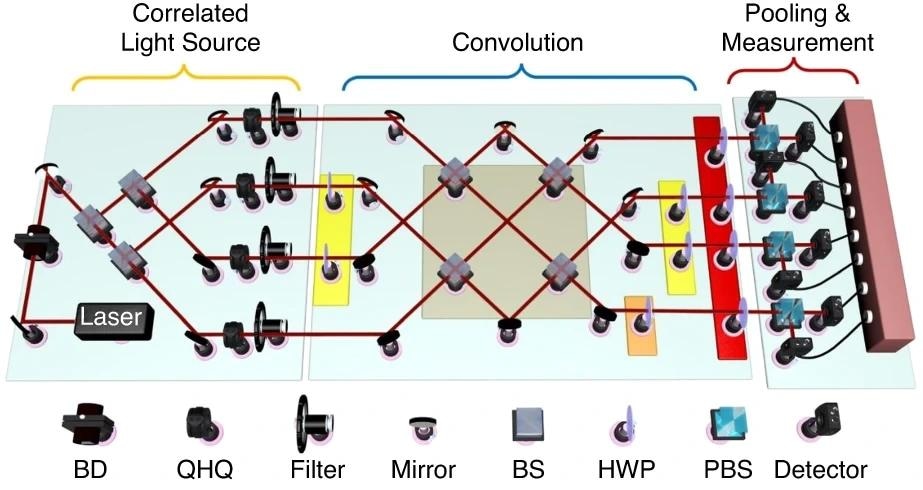In an article recently published in the journal Light: Science & Applications, researchers proposed a correlated optical convolutional neural network (COCNN) that can achieve an algorithmic speed-up similar to the speed-up of quantum neural networks, specifically quantum convolutional neural network (QCNN).
 The experimental realization of a simplified COCNN analog to the 3-qubit QCNN circuit for the phase recognition. Study: https://www.nature.com/articles/s41377-024-01376-7
The experimental realization of a simplified COCNN analog to the 3-qubit QCNN circuit for the phase recognition. Study: https://www.nature.com/articles/s41377-024-01376-7
Limitations of optical neural networks (ONNs)
In recent years, ONNs, which can perform the function of artificial neural networks (ANNs) using optical elements, have received significant attention due to their potential to go beyond the bandwidth limit and reduce energy consumption compared to electrical neural networks. Thus, ONNs can achieve ultrahigh computing frequency that is enabled by the terahertz (THz)-wide telecommunications band. Low crosstalk and heat generation and negligible time delay in propagation are the major advantages of ONNs.
Additionally, ONNs can effectively address the problems caused by the Von Neumann bottleneck, thus avoiding the time and energy consumption limitations when transmitting and reading data from the memories. These advantages make ONNs suitable for tasks such as handwritten digit recognition and image processing. However, the existing ONNs cannot achieve the speedup/acceleration as powerful as that indicated by models like quantum neural networks. Thus, building a new ONN that can offer an algorithmic speed-up is a significant challenge.
Role of quantum neural networks
The advancements of quantum machine learning can meet the data processing requirements with an algorithmic speed-up. Many quantum machine learning algorithms have been proposed for this purpose, including quantum transfer learning, quantum Boltzmann machine, and quantum generative network.
Recently, the QCNN has been theoretically constructed that can identify the symmetry of quantum states. Moreover, a QCNN model's convergence is faster than the conventional convolutional neural network (CNN) model in classical data classification tasks, indicating the significant application potential of QCNN in daily life. However, realizing the QCNN requires a sufficiently long coherence time of the multi-qubit system and a substantial amount of 2-qubit gates, which is technically difficult for the current quantum devices.
The proposed approach
In this study, researchers proposed a new type of optical CNN inspired by the QCNN's theoretical model, designated as COCNN, by introducing the optical correlation. Specifically, they introduced the correlation of light fields to establish this new COCNN framework.
Previous ONNs could only adopt the superposition property of light, while the proposed COCNN can display characteristics similar to those of quantum neural networks. Thus, this new type of ONN can achieve quantum speed-up like the QCNN. Researchers numerically investigated a COCNN model's training process on two datasets and used the CNN model's performance on the same tasks as a reference to verify the speed-up.
The results were obtained from the loss function's convergence curves for a binary classification task. Moreover, the COCNN analog to the 3-qubit QCNN phase recognition circuit was taken as an example to demonstrate the COCNN experimentally. The setup function was initially checked by setting the input to be the analogy of ten quantum states and then set to perform the phase recognition for the ground states of the 3-site Haldane Hamiltonian.
Significance of the study
Researchers demonstrated that the COCNN could achieve "quantum speedup" in the training process. The COCNN model converged faster than the CNN model in the classification tasks considered in this study when the loss function curves of the proposed COCNN model were compared with the conventional CNN model.
Additionally, the COCNN's loss function eventually converged to a smaller value than the CNN's loss function, indicating higher learning accuracy. These results were compatible with the recently proposed QCNN's training performance, which indicated that the speed-up achieved by COCNN was as effective as that of QCNN. The modulation of the correlated beam states was the key aspect of the COCNN strategy driving the acceleration in the training process. The capability of COCNN to perform the QCNN phase recognition circuit validated the connection between the QCNN and the COCNN.
All the experimental results were in good agreement with the theoretical results of the QCNN, which indicated that the QCNN function could be realized in principle using the proposed COCNN scheme. For instance, the COCNN successfully realized the QCNN function of Haldane phase recognition, validating the close relation between the QCNN and COCNN.
To summarize, the findings of this study demonstrated the feasibility of the approach proposed in this study to realize ONNs with the quantum speedup, which could benefit information processing in the big data era. Specifically, the properties of quantum neural networks could be realized in a more affordable way using COCNN.
Journal reference:
- Sun, Y., Li, Q., Kong, L., Zhang, X. (2024). Correlated optical convolutional neural network with “quantum speedup”. Light: Science & Applications, 13(1), 1-14. https://doi.org/10.1038/s41377-024-01376-7, https://www.nature.com/articles/s41377-024-01376-7